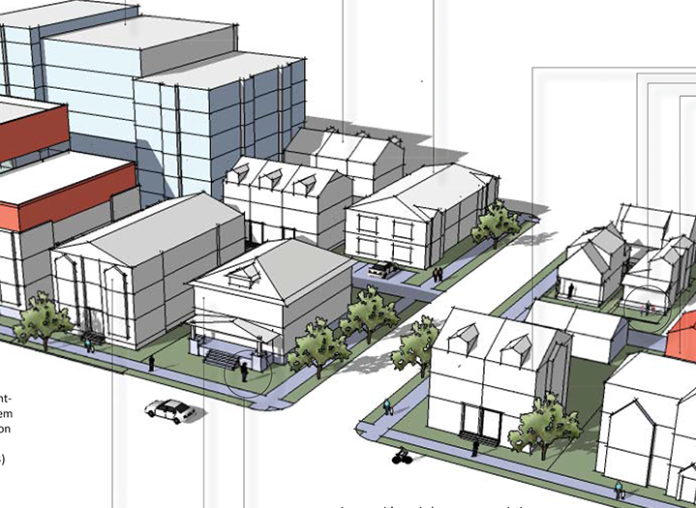Editor’s Note: This article is largely informed by a comprehensive look at the legality of inclusionary zoning by Josephine Ennis which can be found here.
The legality of Seattle’s inclusionary zoning program continues to be questioned by a small, well-funded group of people. The complexities of land use law can lead to numerous avenues that could be pursued to prove (or challenge) the legality of a certain issue. Seattle is pursuing a conservative approach when it comes to inclusionary zoning, aiming to meet the strictest interpretation of the law.
Background
Skepticism about Seattle’s inclusionary zoning program’s legality often references various cases, including federal cases. Since inclusionary zoning was first implemented in the 1970s and exists in more than 500 municipalities, it’s unlikely federal law poses a risk to the program. In fact, the US Supreme Court recently declined to hear a challenge to inclusionary zoning, effectively upholding its legality.
This means questions about the legality of Seattle’s program likely stem from state law, not federal law. The Washington State Supreme Court’s past rulings suggests to some people that inclusionary zoning might be illegal. The court consistently interpreted state law regarding development taxes and fees very strictly. These decisions prevented preservation of low income housing, tenant relocation assistance and open space set asides. Despite these rulings, there is a strong argument to be made the state constitution allows these programs and the current court–with its makeup of different justices–might overrule previous interpretations.
Regardless, in 2006 the Washington State legislature amended state law to explicitly allow inclusionary zoning. Since then a few municipalities implemented inclusionary zoning, including mandatory requirements. This means the question of legality now rests on the design of programs. Seattle’s policy attempts to meet a strict interpretation of state law, even though other designs might also be legal.
The Legality Of Mandatory Inclusionary Zoning
To meet the strictest interpretation of state law, Seattle looked to the 2006 amendment on inclusionary zoning. This amendment sometimes divides opinions about the legality of mandatory inclusionary zoning because of this paragraph:
If a developer chooses not to participate in an optional affordable housing incentive program adopted and authorized under this section, a city, county, or town may not condition, deny, or delay the issuance of a permit or development approval that is consistent with zoning and development standards on the subject property absent incentive provisions of this program.
This paragraph applies to programs that are ‘optional’ by design but the law does not state that all programs must be optional or voluntary. In fact, if all programs were required to be voluntary or optional, using the word optional in this paragraph would be unnecessary. Later in the regulation, the law states:
The jurisdiction may establish a minimum amount of affordable housing that must be provided by all residential developments being built under the revised regulations, consistent with the requirements of this section.
The language referring to requiring a minimum amount of affordable housing from all residential development strongly suggests a mandatory program.
Lastly, courts are required to follow administrative rules established by agencies so long as those rules are within the agency’s authority. Following the passage of the inclusionary zoning language, the commerce department established rules on incentive zoning, explicitly stating that municipalities can create mandatory inclusionary zoning laws.
Designing A Legal Mandatory Inclusionary Zoning Program
Since Seattle believes a mandatory program is legal, the design must also comply with state law. Some criticisms of Seattle’s MHA program contend that the design must provide an equal or greater value to returns on investment on a percentage basis. In other words, if a hypothetical project earns 10% back on it’s investment before MHA, the law would require a 10% or greater return after MHA. While federal cases dealt with this argument, state law says nothing about it. The state law says:
The incentives or bonuses shall provide for the development of low-income housing units
The most practical guidance on how to determine whether or not the upzones are sufficient is probably found in this advisory document by The Housing Partnership:
the key to the fairness of mandatory programs is to ensure that the value of incentives fully offsets the cost of the subsidy to the included units.
This guidance suggests Seattle only needs to show they made a reasonable effort to increase profits through incentives–density bonuses–equal to or greater than the subsidy needed for the affordable units. For example, if an affordable unit rents at $1,000 and market rate units rent at $1,500, profits from upzoning should equal a value of at least $500. This has nothing to do with the percent a developer returns on their investment.
Seattle is accomplishing this through upzones and FAR increases, allowing developers to build additional market rate units. Seattle’s consultant studies shows the value of upzones are generally sufficient to cover the cost of the MHA subsidies. A simplified example can also be found in this spreadsheet which allows people to try different development assumptions. Overall, the evidence suggests the value of the upzones are greater than the cost of the subsidies. While this doesn’t address how to best design an inclusionary zoning policy, it does indicate that Seattle’s program will likely meet the legal requirements. If Seattle is ultimately sued it will likely clear the hurdle of a strict legal interpretation.
Related Article
Misleading Sightline Articles Undermine Inclusionary Zoning Effort

Owen Pickford
Owen is a solutions engineer for a software company. He has an amateur interest in urban policy, focusing on housing. His primary mode is a bicycle but isn't ashamed of riding down the hill and taking the bus back up. Feel free to tweet at him: @pickovven.

